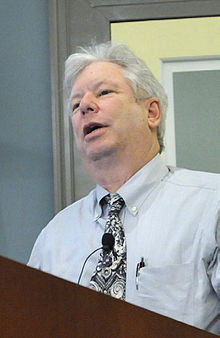Richard Thaler
| Richard Thaler | |
|---|---|

Richard Thaler in 2012.
|
|
| Born |
September 12, 1945 East Orange, New Jersey |
| Nationality | United States |
| Institution |
University of Chicago Booth School of Business 1995– Johnson Graduate School of Management 1978–1995 |
| Field | Behavioral finance |
| Alma mater |
University of Rochester (M.A. 1970, Ph.D. 1974) Case Western Reserve University (B.A. 1967) Newark Academy |
| Doctoral advisor |
Sherwin Rosen |
| Influences | Daniel Kahneman, Herbert A. Simon |
| Influenced | George Loewenstein, Dan Ariely |
| Information at IDEAS / RePEc | |
Richard H. Thaler (born September 12, 1945) is an American economist and the Ralph and Dorothy Keller Distinguished Service Professor of Behavioral Science and Economics at the University of Chicago Booth School of Business.
He is perhaps best known as a theorist in behavioral finance, and for his collaboration with Daniel Kahneman and others in further defining that field.
Thaler has written a number of books intended for a lay reader on the subject of behavioral finance, including Quasi-rational Economics and The Winner's Curse, the latter of which contains many of his Anomalies columns revised and adapted for a popular audience. His leitmotif is that market-based approaches are incomplete: he is quoted as saying "conventional economics assumes that people are highly-rational – super-rational – and unemotional. They can calculate like a computer and have no self-control problems."
Most recently, Thaler is author of Misbehaving: The Making of Behavioral Economics (W. W. Norton & Company, May 11, 2015) .
Thaler is coauthor, with Cass Sunstein, of Nudge: Improving Decisions About Health, Wealth, and Happiness (Yale University Press, 2008). Nudge discusses how public and private organizations can help people make better choices in their daily lives. "People often make poor choices – and look back at them with bafflement!" Thaler and Sunstein write. "We do this because as human beings, we all are susceptible to a wide array of routine biases that can lead to an equally wide array of embarrassing in education, personal finance, health care, mortgages and credit cards, happiness, and even the planet itself." Thaler and his co-author coined the term choice architect.
Thaler gained some attention in the field of economics for publishing a regular column in the Journal of Economic Perspectives from 1987 to 1990 titled Anomalies, in which he documented individual instances of economic behavior that seemed to violate traditional microeconomic theory.
...
Wikipedia
